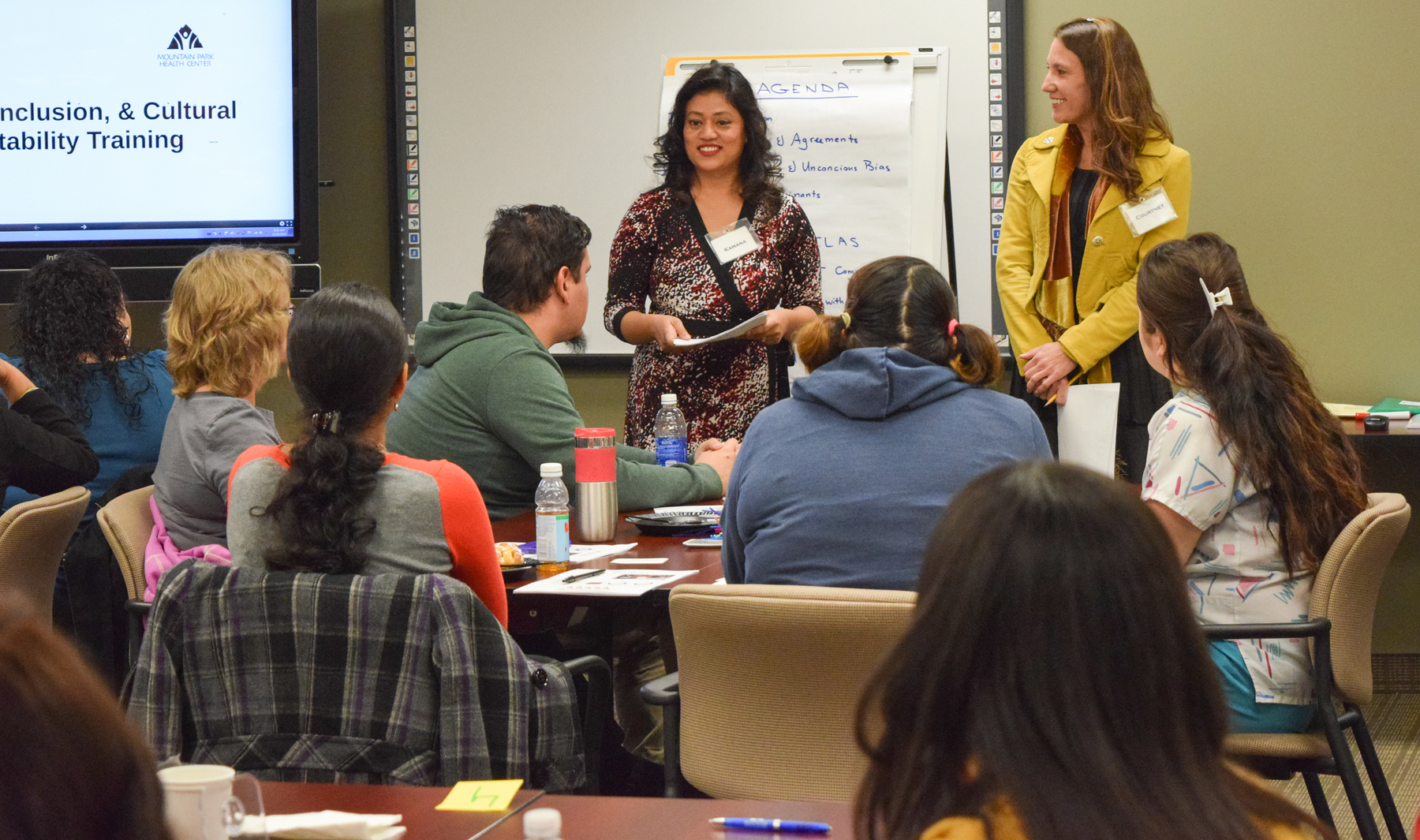- Essen Otu, Senior Director of Diversity & Community Affairs, eotu@mphc-az.org
- Michelle Hernandez, Senior Director of Marketing and Engagement, mhernandez@mphc-az.org
Patient Stories: Two staff from the Marketing and Engagement team randomly visit one clinic site each week to interview a patient regarding their experience at the health center. These stories are distributed throughout the organization’s network and posted on the website. Patient stories serve as an exemplary learning tool for staff across all levels as they demonstrate the impact that delivering high quality, culturally and linguistically appropriate care can have on a patient’s health and wellbeing.
 Vianey Olivarria, of the Marketing and Engagement team, connecting with patients in waiting rooms at Mountain Park.
Vianey Olivarria, of the Marketing and Engagement team, connecting with patients in waiting rooms at Mountain Park.
Patient Surveys: All patients who call the scheduling center are given the option to complete a survey that assesses satisfaction of clinic services. Patient survey questions include:
- In the last 12 months when you called to schedule your follow up appointment with your provider were you able to see her/him?
- In the last 12 months did you see a specialist for a particular health problem? If yes, did Mountain Park staff help you get an appointment with the specialist?
- In the last 12 months, did your provider engage you in conversation about your care and did he/she explain things in a manner that was easy to understand?
- In the last 12 months, when you phoned your provider during regular office hours how often did you get an answer to your medical question in a timely manner?
- Wait time includes the waiting room and exam room. In the last 12 months how often did you see this provider in a timely fashion?
In addition, the Marketing and Engagement team calls individual patients to solicit feedback on their experiences and suggestions for service improvement. Patients are asked opened ended questions including: “How did we do?” or “What could we do better?” These calls are intended to be conversational and allow the patient to share their honest thoughts. Patient responses are shared on a quarterly basis with the Board of Directors and the Clinical Operations team, and used to identify areas needing additional support for improvement.
Customer Service Meetings: Every month the Quality Team meets to discuss customer service issues and determine solutions. This team is cross-functional and comprised of 30 individuals, including members from the quality improvement team, executive team, clinic supervisors, and clinical chairs.
Diversity, Inclusion, and Cultural Adaptability Training: Mountain Park seeks to create an environment where employees will thrive, recognizing that good customer service naturally stems from staff that feel supported and respected by both their peers and employer. The organization has implemented a mandatory 3.5-hour training for staff at all levels to ensure that everyone has opportunities to learn how to interact with one another, as well as how best to work with and serve a diverse population. To measure the success of its customer service initiatives, Mountain Park completes an annual Diversity and Inclusion Assessment. The organization conducts surveys, focus groups, and interviews with key stakeholders such as patients, employees and community partners. Qualitative and quantitative data collected from this process has led to:
- Training staff on the unique health needs of the lesbian, gay, bisexual, and trans (LGBT) community, as well as the appropriate use of gender pronouns;
- Medical interpreter training for more than 40 Mountain Park staff; and
- The development of interpretation and translation policies and procedure.
 Mountain Park staff participating in the Diversity, Inclusion, and Cultural Adaptability training.
Mountain Park staff participating in the Diversity, Inclusion, and Cultural Adaptability training.
Customer service is fundamental to Mountain Park’s business model. Leadership recognizes that the potential benefits of investing in customer service initiatives outweigh the costs, and therefore uses general funds to support ongoing customer service efforts. Creating a culture of inclusion has led to better quality of care for patients, improved staff engagement and skills, and recognition of Mountain Park as a trusted partner in the community. For organizations seeking to implement similar customer service strategies, Mountain Park stresses the importance of having strong support from leadership. Changing the culture of an organization can be very difficult, with longtime patients and staff members potentially reluctant to adopt new care methods. Having leadership address their concerns and implement responsive strategies can help facilitate the process of adopting new customer service practices. Furthermore, maintaining patience throughout the process and communicating why changes are being made will assist in gaining overall community support.
Disclaimer This report was supported by the Health Resources and Services Administration (HRSA) of the U.S. Department of Health and Human Services (HHS) under grant number U30CS09743, a National Training & Technical Assistance Cooperative Agreement, in the amount of $770,259. This information or content and conclusions are those of the author and should not be construed as the official position or policy of, nor should any endorsements be inferred by HRSA, HHS or the U.S. Government.
